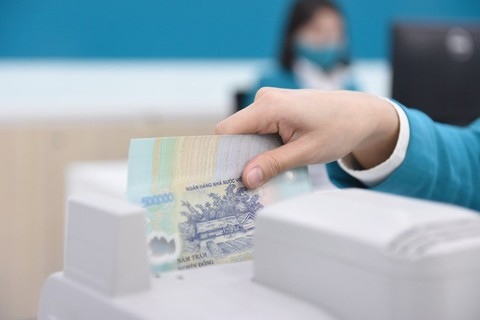Strong measures needed to avoid bad debt rise
Strong measures needed to avoid bad debt rise
The extension of a policy on allowing commercial banks to reschedule the debt repayment period and maintain the debt group is necessary, but strong solutions are needed to avoid bad debt increasing in the future, experts said.

A bank teller counts money at a transaction office in Hà Nội. Experts say solutions are needed to avoid bad debt increasing. — Photo vietnamfinance.vn |
The State Bank of Việt Nam (SBV) last month decided to extend Circular 02/2023/TT-NHNN on allowing banks to reschedule the debt repayment period and maintain the debt group for certain sectors for additional six months until the end of this year instead of ending June 30, 2024.
The extension is expected to reduce pressure on companies which are struggling to service their debts and support economic recovery under the current challenging economic situation.
The six month extention is welcomed by most businesses, as well as the banking sector, both of whom were concerned over their ability to meet the payment deadline of June 30 this year.
Despite believing the extension is necessary in the short term, experts are also concerned, especially when this regulation expires, as it will create great pressure on the banking system because bad debts are not accurately reflected.
They explained with this regulation, the bad debt ratio of banks is better in the present and will be lower than the reality because it is pushed to the future. The risk of bad debt is always present and the bad debt ratio will increase suddenly when this circular expires at the end of this year.
Financial expert Dr Nguyễn Hữu Huân believes that this policy also has a downside as it is like a ‘curtain to cover bad debts’ because the scale and ratio of bad debt will actually be ‘hidden’ and will be return in the future.
According to Huân, if the SBV did not continue to extend Circular 02 to the end of this year, the bad debt ratio could have increase significantly, even double or triple the current figure. If enterprises have not increased their cash flow and their business efficiency has not improved, this creates potential risks for the banking system, he added.
Chief economist at the Bank for Investment and Development of Việt Nam Cấn Văn Lực warned when this circular expires, if enterprises do not recover, the risk of bad debts may increase, which will negatively affect both borrowers and lenders.
Experts said strong measures on increasing risk provisions and recovering bad debts should be taken to avoid the debts rising sharply in the future.
Sharing the same view, financial expert Nguyễn Trí Hiếu said when the policy expires at the end of this year, the SBV should not extend it because it will make the financial picture of the economy inaccurate.
Banks need to fully classify debt groups to make credit quality clearer, because this is related to monetary management policies in particular and the general economic policy of the Government, Hiếu stressed.
Bad debts in the banking system in the first five months of 2024 have continued to increase by some VNĐ75.9 trillion against the end of 2023.
Việt Dragon Securities Company (VDSC) cited the latest data from the State Bank of Vietnam (SBV) showing that the bad debt ratio of the banking system as of the end of May 2024 was at 4.94 per cent, higher than the 4.55 per cent at the end of 2023.
The data also shows debts, which had the repayment period to be restructured, and the debt group changed according to Circular No 06/2024 and Circular No 02/2023 of the SBV, increased quite sharply by 25.5 per cent compared to the end of 2023 to VNĐ230.4 trillion.
At the same time, the number of borrowers, who had the repayment period restructured and the debt group unchanged, also surged sharply from 188,000 to 282,000 as of the end of June 2024.
According to the SBV, credit by the end of June 2024 increased by about 6 per cent compared to the beginning of the year, reaching nearly VNĐ14.4 quadrillion. The central bank still has to control risks, ensure the safety of the banking system and focus on economic growth drivers, including those meeting new trends such as green credit.
Experts attributed the high credit growth in the first half of 2024 to recovery in loan demand, promotion in public investment, tax and fee reduction policies and implementation of preferential interest rate lending packages.
They forecast loan demand in the second half of this year will continue to accelerate thanks to macro economic recovery. The manufacturing sector has shown signs of recovery, the industrial production index in the past six months was estimated to increase by 7.54 per cent over the same period in 2023.
























